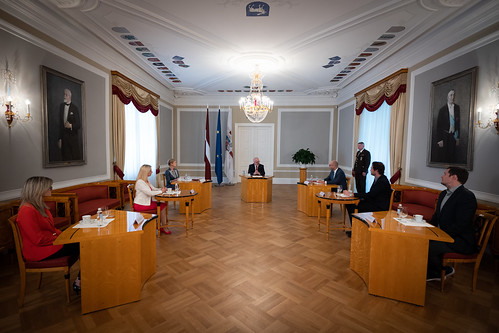The main focus of the discussion was the exit of public media from the advertising market, which both parties agreed would not only strengthen the public media, but also the information space of Latvia which plays an especially important role at this time when democracy is facing various threats. Likewise, it was agreed that, following this decision, the development of public media could become more focused and targeted.
The President of Latvia noted: “The exit of public media from the advertising market would fulfil society’s need for an independent and democratic source of information, because a strong information space in Latvia is currently more important than ever. By numbers, we are a relatively small society, thus we are in even greater need of high-quality public media, whose quality is supervised by the public itself, inter alia through the public service remit. Furthermore, exiting from the advertising market would liberate public media from ratings, thus providing them the freedom to completely fulfil their public service duty. With the advertising market being at the full disposal of only commercial media, their performance would also be strengthened and the overall quality of the information space of Latvia would improve, which is in the interests of the whole of society.”
The President of Latvia also emphasised that the public media are a specific type of media, and, as opposed to commercial media, their objective is not profit, but rather fulfilment of the public service remit as issued by the NEPLP for the public media to function in the interests of society. “NEPLP has been authorized to issue the public service remit and, in turn, the public media are to fulfil it,” President Levits said.
Ivars Āboliņš, Chair of the NEPLP, highlighted that the public media and the content that they create is the cornerstone of the information space of Latvia, therefore it is the state’s duty to ensure that our public media are strong: “This decision, which would be of historic significance for Latvia, would allow us to have stronger public media and a stronger information space in Latvia.” The concept submitted to the government by the NEPLP states that 8.3 million euros would be necessary for the public media to exit the advertising market.
During the discussion, the need for developing public media infrastructure was also discussed, as was the idea to create a multimedia platform with high-quality content for minority groups and issues pertaining to the journalist profession, accountability, ethics and quality of education. The functions of the NEPLP and its capacity to ensure a strong information space and the necessary resources were also discussed.





